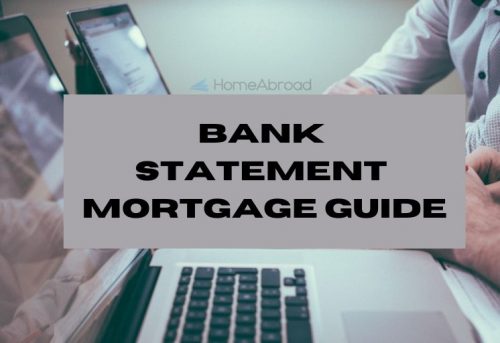Getting a bank statement mortgage loan can be a great way to get approved for a loan if you are self-employed or have an irregular income. A bank statement mortgage requires the lender to look only at your recent bank statements instead of relying on more traditional documents like tax returns or pay stubs.
Getting approved for a bank statement mortgage loan is relatively straightforward, involving a few steps. This article will not only list these steps but also discuss them elaborately.
Table of Contents
What is a Bank Statement Mortgage Loan Program?
A Bank statement mortgage loan program is also referred to as Income Loan. It is an effective way of getting a hassle-free and swift mortgage for self-employed borrowers like doctors, lawyers, freelancers, or business owners.
Unlike other loans, bank statement mortgage lenders don’t require W-2s, tax returns, or other typical proofs of creditworthiness. Instead, all you must submit to a lender are your bank statements spanning from 12 to 24 months. And, if you are self-employed or own a business, you can show your profit and loss statements too.
The lender will verify your bank statements and profit and loss statements by submitting a verification of deposit (VOD) or by faxing or calling the bank. This is because the lender needs to see and analyze the inflow and outflow from the account while also determining if you have enough revenue to make regular repayments.
No Tax Return or Tedious Employment Paperwork Required
Getting conventional loans or government-backed loans is very challenging for self-employed borrowers as they require traditional income documentation like income proof, tax returns, pay stubs, etc. Traditional loans often involve tremendous paperwork and scrutinization and are time-consuming.
On the other hand, bank statement loans are not backed by Fannie Mae and Freddie Mac as they are Non-QM Loans. Only a handful of lenders offer this convenient and swift mortgage, and HomeAbroad can connect you with the best of them for free. All you need to do is reach out to us.
How does Bank Statement Loan work?
The concept of bank statement loans is based on recent bank statements of the borrower.
Bank Statement Program: This should include at least two full years of banking history. The mortgage lender would also require the profit and loss statement from self-employed freelancers, independent contractors, or business owners. A profit and loss statement provides information related to revenues, expenses, and costs incurred by the borrower within a given time frame. Also, while applying for the loan, the borrower has to provide both business and personal bank statements.
Interest Rate: Income loans are a great way of purchasing investment properties. However, they may often have a slightly higher rate of interest in comparison to FHA loans or conventional loans. As of 16th February 2023, the interest rate of 5.250%, with 3.375% points and 7.611% APR.
Down Payment: Since the bank statement loan program falls under Non-QM loans, mortgage lenders typically require a higher down payment of around 10% to 20% of the entire loan amount.
Credit Score: Generally, to qualify for bank statement mortgage programs, the borrower is expected to maintain a good credit score with a minimum of 620. Nevertheless, those with a credit score of about 700 or higher are likely to receive relatively relaxed interest rates and terms.
Source and Seasoned: Lenders consider the borrower’s assets, known as “Source,” and funds, called “Seasoned,” before approving the loan request. The borrower’s bank statement is vital in helping the lender draw estimates of these two key factors.
While analyzing the source provides the lender with the confidence that the borrower’s documents are not fraud, analyzing the season secures the lender against the slumps of the market.
What do underwriters analyze in Bank Statements?
Lenders assess bank statements to evaluate a borrower’s financial health and stability. Underwriters look for evidence of regular deposits, a steady source of income, and manageable cash flow.
Unstable income
It is one of the first red flags underwriters look for when reviewing bank statements. Unstable income includes irregular deposits or withdrawals inconsistent with regular payroll deposits and large transfers from other accounts, such as personal loans or investments. Unstable income is generally considered a sign of financial instability and could be interpreted as a potential risk for loan repayment. Unstable income can also include frequent overdrafts or bounced checks, which indicate poor money management skills. Lenders often see unstable income as a major red flag, so managing your finances carefully if you want to get approved for a loan is essential.
Overdrafts
Overdrafts are one of the most common bank statement red flags. Underwriters will look at overdrafts that have occurred in the past six months and any fees incurred due to them. Unauthorized overdrafts are a sign of poor money management skills and could indicate your lack of financial responsibility. If you’ve been charged overdraft fees multiple times, it’s essential to address the issue and show lenders that you are committed to avoiding them.
Low Savings Account Balances
Inevitably, life happens, and it’s important to be financially prepared for whatever comes your way. Underwriters will assess how much money you have saved in the form of a liquid asset—meaning cash easily accessible from checking or savings accounts— and how much you have in reserve for a rainy day. Low savings account balances don’t necessarily spell trouble, but it is a sign that you may not be adequately prepared for sudden expenses, like medical bills or home repairs.
Also Read: A Complete Guide To Self-Employment Mortgage
Who can apply for Bank Statement Loan?
The bank statement mortgage loan program is for business owners and self-employed borrowers who need help in producing conventional/traditional mortgage loan requirements of employment documentation. Often this category of borrowers finds it difficult to produce consistent paychecks as proof of their stable income and loan worthiness. Also, this loan is an excellent option for those who claim a significant tax deduction.
- Business owners
- Freelance Employees
- Solo Proprietors
- Realtors
- Entrepreneurs
- Independent Contractors
- Consultants
- Realtors
What types of properties can I purchase from Bank Statement Mortgage?
Bank Statement Mortgage Loans can be used to purchase a variety of different types of properties, like,
Single Family Homes: This type of property is the most common choice for borrowers looking to purchase a home with a Bank Statement Loan.
Single Units: A single-unit rental property can be used for investments or personal residences.
Multi-Family Homes: Multi-family properties are those that have more than one unit, such as duplexes, triplexes, and fourplexes. These can be used as investments or for personal residence.
Condo/Townhouse: Condos and townhomes are eligible for Bank Statement Loans and can be used as investments or for personal residence.
Commercial Property: You may also use Bank Statement Mortgage Loans to purchase commercial property, such as retail stores, office complexes, and more.
If you are interested in using a Bank Statement Mortgage Loan to purchase a property, it is important to speak with a mortgage lender to learn more about the specific requirements and guidelines that may apply.
Which is better, Traditional Mortgage Loans or a Bank Statement Loan?
Traditional Mortgage Loans: Traditional mortgage loans benefit those with consistent income and can provide proof of employment. This type of loan typically requires borrowers to submit two years of tax returns, two months of bank statements, and other documentation such as W2s or pay stubs in order to qualify.
Bank Statement Loan: Bank statement loan, also known as Income Loan, is a non-QM loan, which means the government does not back it. Only private lenders can finance this loan type.
It is beneficial for those who need help providing proof of income or employment and wish to procure a fast and hassle-free loan. Here, the borrower must only submit business and personal bank statements spanning over 12 to 24 months to qualify.
The bank statement mortgage loan is a great option for self-employed people, investors, and business owners who want the convenience and flexibility of using their current banking information to qualify for a loan.
What are the key eligibility criteria for a Bank Statement Loan?
In order to qualify for a bank statement loan, applicants must meet the following criteria:
- Have no more than two thirty-day late payments on any credit accounts within the last twelve months from the same account.
- Be at least 21 years of age and a legal resident of the United States.
- Have no bankruptcies in their recent credit history.
- Applicants may also have a co-borrower who is a W2 employee and can apply for the loan jointly.
- Have at least one full year of consistent income or employment. (If applicable)
- Self-employed borrowers must provide two years of income tax returns.
- Have a minimum credit score of 620, though some lenders may prefer higher scores.
- Social Security Number
- Proof of identity (driver’s license or passport)
- For the borrower and any co-borrowers, proof of income, such as pay stubs or W2 forms.
How can I apply for the Bank Statement Mortgage?
Following are the 5 easy steps to apply for the bank statement mortgage loan.
1. Shop for the Right Lender
HomeAbroad offers bank statement loans with the best terms and fast approvals. Get your rate quote today!

Pre-qualify for a Bank Statement Loan.
No Paystubs or W2s Required.
2. Gather Financial Documents
Once you’ve chosen a lender, gather all the necessary financial documents, such as tax returns, pay stubs, bank statements, and other documents needed to apply for the loan if you are applying with a W2 co-Borrower. If you are applying individually, have your business and personal bank statements from the past two years in place.
Use our Bank Statement Calculator to determine how much you can borrow based on your bank statement income.
3. Submit Your Application
Submit your complete application and all necessary documentation to the lender. The lender will review the information and decide if they can approve you for a bank statement loan.
4. Wait For Approval
After submitting your application, you’ll need to wait for approval which could take anywhere from a few days to some weeks, depending on the lender and your credit score. The loan officer will be able to provide more information about the timeline for your specific application.
5. Final Steps
After you are approved, you’ll need to sign any necessary documents and set up payments with the lender. Be sure to read all documents carefully before signing, and keep copies of all paperwork for your records.
How many months of statements are needed for a Bank Statement Loan?
Most lenders will require you to provide at least 24 months of bank statements to prove your repayment capability. If you are self-employed and do not have traditional forms of income documentation, the lender may ask for additional documentation, such as profit and loss statements. Be prepared to provide at least two years of documents if you are self-employed to get approved for the loan.
At HomeAbroad, we understand the complexities of applying for a bank statement loan and can quickly help you find the right lender. Contact us today to get started on your real estate journey.
What Credit Score Do I Need For a Bank Statement Mortgage Loan?
Most lenders will seek a minimum credit score of 620 to approve a bank statement mortgage loan. However, some lenders may have higher requirements. The better your credit score is, the better rate and terms you can expect from the lender. So it is essential to ensure your credit score is as high as possible before applying for the loan.
Getting a Bank Statement can be challenging if you are a US newcomer and need a thin US credit score. To get over this challenge, you can reach out to HomeAbroad to get the best deal on Bank Statement Loan Program.
Advantages of The Bank Statement Loan
A bank statement loan offers several advantages for borrowers. Here are a few key benefits of this type of mortgage:
- Self-employed and business owners can qualify for a loan even if their income is not traditional.
- Usually, lenders accept a debt-to-income ratio of about 50 %.
- Borrowers can use the loan to purchase a primary residence, vacation home, or investment property.
- A borrower may choose either an adjustable mortgage or a fixed-rate mortgage.
- Borrowers with variable incomes may still be able to show the lender that they can make payments on time.
- Bank statement loans are generally easier to qualify for compared to traditional mortgages.
- Also, an option for an interest-only mortgage is available.
- It needs you to pay a relatively lesser down payment of 10% only.
- The option of a cash-out refinance loan is also available. A lender may ask the borrower for 80 percent of the value of your property.
- A borrower may avail of a loan of up to $5 million.
Conclusion
A bank statement loan can be an excellent option for self-employed borrowers, freelancers, or business owners who have less-than-perfect credit, need additional funds quickly, or have an inconsistent monthly income. However, it is important to compare rates and terms from different lenders and gather all necessary documents before applying.
HomeAbroad offers bank statement loans with the best terms and fast approvals. Get your rate quote today!
Frequently Asked Questions
1. Can I get a mortgage with bank statements?
Yes, you can get a mortgage with bank statements. Most lenders will require at least two years of bank statements to prove your repayment capability. However, some lenders may have higher requirements if you are self-employed or do not have traditional forms of income documentation.
2. Are bank statement mortgages worth it?
Yes, bank statement mortgages can be worth it. They can provide more flexibility for self-employed borrowers, freelancers, or business owners with inconsistent monthly income. Plus, you can get approved quickly and easily with the right lender.
3. What credit score is needed for a bank statement mortgage?
Most lenders seek a minimum credit score of 620 to qualify for a bank statement mortgage loan. However, some lenders may have higher requirements. The better your credit score is, the better the rate and terms you can expect from the lender.
4. How many months of bank statements do you need to get a mortgage?
Most lenders will require you to provide at least 24 months of bank statements to prove your repayment capability. So be prepared to provide at least two years of documents to get approved for the loan if you are self-employed.
5. Who can apply for a Bank Statement Loan?
Anyone with self-employed income, freelancers, and business owners is eligible for a Bank Statement Loan. In addition, people who have an inconsistent monthly payment or need additional funds quickly can also apply for it.
6. What do lenders look for on business bank statements?
Lenders often use bank statements to gauge the performance of your business. For example, they look into the inflow and outflow of cash. In addition, it helps them estimate your repayment capability.
7. Can you use Bank Statements as proof of income for the mortgage?
Yes, you can use bank statements as proof of income for a mortgage. This is especially useful if you are a self-employed freelancer or business owner who does not have traditional forms of income documentation. However, it is important to provide at least two years of the most recent bank statements to prove your repayment capability.
8. What is the minimum down payment for a bank statement loan?
The minimum down payment for a bank statement loan will vary depending on the lender and your credit score. Generally, lenders require a minimum of 10% of the purchase price as a down payment.
9. How far back do underwriters look at bank statements?
Underwriters often look at bank statements for the past 12-24 months to determine your payment history and repayment capability.

















